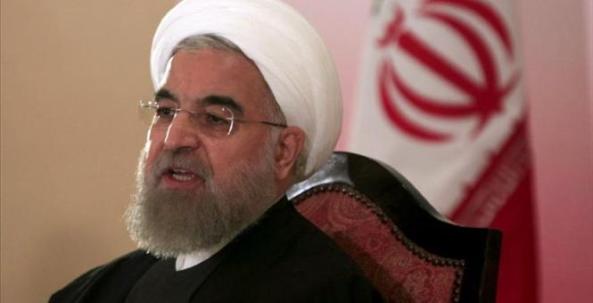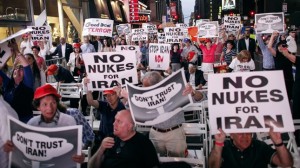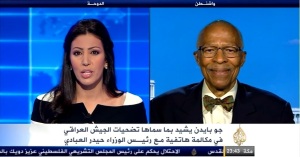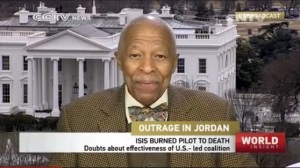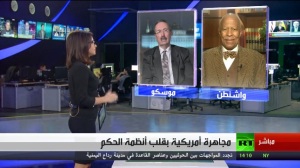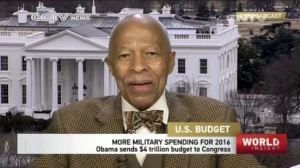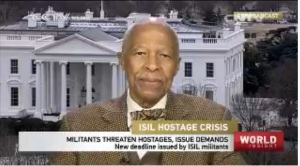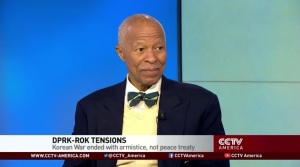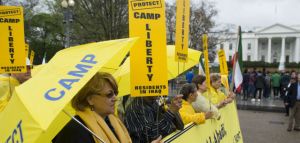 On the night of Oct. 29, Camp Liberty, which houses some 2,250 Iranian exiles, was the target of a rocket attack that killed 23 people. En route to the Vienna Talks on Syria, Secretary John Kerry quickly condemned the attack and offered the United States’ condolences “to the families of the victims, and we hope for the swift recovery of those injured.” He added, “We also urge the Government of Iraq to provide additional security for the camp’s residents and to find the perpetrators and hold them accountable for the attack, consistent with its obligations under the Dec. 25, 2011 agreement with the United Nations.”
On the night of Oct. 29, Camp Liberty, which houses some 2,250 Iranian exiles, was the target of a rocket attack that killed 23 people. En route to the Vienna Talks on Syria, Secretary John Kerry quickly condemned the attack and offered the United States’ condolences “to the families of the victims, and we hope for the swift recovery of those injured.” He added, “We also urge the Government of Iraq to provide additional security for the camp’s residents and to find the perpetrators and hold them accountable for the attack, consistent with its obligations under the Dec. 25, 2011 agreement with the United Nations.”
The Associated Press and the Washington Times both covered the attack. Agence France Presse and the conservative news service CNS, reported bipartisan congressional calls for action. Digital Journal included a link to detailed video footage. Another clip shows the scene shortly after the attack. The calls included two Republicans, House Foreign Affairs Committee Chair Ed Royce and Ileana Ros-Lehtinen, as well as a Democrat Rep. Judy Chu.
Critics of the Mujahideen-e Khalq (MEK) might say that the media coverage is really not independent because each one merely quotes what the Iranian dissidents said. But I say that when the mainstream media gives so much ink to a story, it is some evidence that they take the allegations seriously.
Critics might also say that members of Congress supportive of the MEK are acting in the interest of campaign contributions. But I say that the burden is on the naysayers to provide the evidence linking Royce, Ros-Lehtinen, and Chu as being “bought off” by the MEK. I am personally aquatinted with each of them, and I am impressed with their integrity and commitment to the MEK especially on humanitarian grounds. The attack is the epitome of a humanitarian tragedy.
Why is Iran targeting its opposition? Dissidents are trying to block Tehran’s aspirations to control Baghdad and Damascus, where the United States is fighting the Islamic State. Washington’s evolving strategy is dead on arrival on the Hill unless the Obama administration reaches out to the opposition and sees Iran as a threat across the porous border.
So how can it counter the threat from Iran? Align with others opposing Tehran and the bipartisan congressional coalition sharing that view.
Saudi Arabia’s alignment against Iran includes Israel as a silent partner. Saudis view Tehran and Damascus unfavorably. A potential partner for Riyadh and Washington is the Iranian resistance that rejects clerical rule in Tehran. All define the threat as Islamist.
On Oct. 5, 2015 Saudi Foreign Minister Adel al-Jubeir asked whether Iran is a “state or a revolution,” If it wants to export its 1979 revolution and revive the Persian Empire, “we cannot deal with it,” said Israeli Prime Minister Binyamin Netanyahu in his speech before the U.N. on Oct. 1. Shifting alliances in the Middle East are drawing Arab countries like Saudi Arabia closer to Israel in confronting Iran and the Islamic State. Netanyahu’s Mar. 3 speech before the Congress stated that, “Iran’s regime poses a grave threat, not only to Israel, but also the peace of the entire world.”
Both Adel al-Jubeir and Netanyahu have previously distanced themselves from the MEK on different grounds. On one hand, Saudis attribute too much power to the MEK because of their role in bringing down the Shah — if their supporters can topple the Shah, perhaps they will side with those who wish to bring down the Kingdom. On the other hand, Netanyahu believes that the MEK is of too little consequence to cause even further trouble with the State Department, which fails to reach out to the MEK. Both assessments are based on my interviews with high level Saudis and Israelis.
My take is that the MEK is neither strong nor weak based on indicators like the following. According to my research, reported in my book Arab Rebels and Iranian Dissidents, during mid-2000, the Iranian regime paid more attention to the MEK than to all other groups combined, created expositions in every major city of Iran to warn the youths of the pro-democracy views of the organization, and paroled Ayatollah Ali Akbar Hashemi-Rafsanjani’s daughter from prison because she was learning too many subversive ideas from MEK prisoners. In the expositions and the early release, Tehran’s tactics against the MEK backfired.
On Apr. 29, the House Foreign Affairs Committee held a hearing, “ISIS: Defining the Enemy.” Maryam Rajavi is President-Elect of the National Council of Resistance of Iran (NCRI), the coalition of which the MEK is the largest unit; she testified from Paris. Her written testimony showed how Tehran is an Islamist epicenter of terrorism to establish an Empire without borders and called for empowering the democratic tolerant Islam she represented.
Critics might argue that it is easy to promise democracy and criticize the regime as being an Islamist epicenter. There is “evidence” the MEK is an intolerant cult, which forces its members to drink the proverbial Kool-Aid. I have interviewed family members of a young girl who committed suicide when Maryam Rajavi was in a Paris jail. The parents told me they did not believe their daughter had done so because of pressure from the MEK. Indeed, when the jailers informed Rajavi of the suicide, she immediately issued a statement saying that she neither sanctions such behavior nor wishes anyone else to do so in the future — not the words of a cult leader.
I grant the jury is out whether the MEK will be as tolerant when the regime falls as Tehran has been intolerant towards the MEK. Think of a soft landing when the regime falls as in the disintegration of communism in Europe or a hard landing like the one in Libya. If soft, then I expect a tolerant MEK.
To continue reading please go to: http://atfp.co/1HxuCfN
